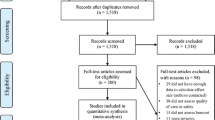Abstract
Background
Two-thirds of patients with cirrhosis do not receive guideline-concordant liver care. Cirrhosis patients are less likely to receive recommended care when followed exclusively by primary care providers (PCPs), as opposed to specialty co-management. Little is known about how to optimize cirrhosis care delivered by PCPs.
Aims
We conducted a qualitative analysis to explore PCPs’ attitudes and self-reported roles in caring for patients with cirrhosis.
Methods
We recruited PCPs from seven Veterans Affairs facilities in the Pacific Northwest via in-service trainings and direct email from March to October 2012 (n = 24). Trained staff administered structured telephone interviews covering: (1) general attitudes; (2) roles and practices; and (3) barriers and facilitators to cirrhosis management. Two trained, independent coders reviewed each interview transcript and thematically coded responses.
Results
Three overarching themes emerged in PCPs’ perceptions of cirrhosis patients: the often overwhelming complexity of comorbid medical, psychiatric, and substance issues; the importance of patient self-management; and challenges surrounding specialty care involvement and co-management of cirrhosis. While PCPs felt they brought important skills to bear, such as empathy and care coordination, they strongly preferred to defer major cirrhosis management decisions to specialists. The most commonly reported barriers to care included patient behaviors, access issues, and conflicts with specialists.
Conclusions
PCPs perceive Veterans with cirrhosis as having significant medical and psychosocial challenges. PCPs tend not to see their role as directing cirrhosis-related management decisions. Educational efforts directed at PCPs must foster PCP empowerment and improve comfort with managing cirrhosis.
Similar content being viewed by others
References
Peery AF, Dellon ES, Lund J, et al. Burden of gastrointestinal disease in the United States: 2012 update. Gastroenterology. 2012;143:e1171–e1173.
Bell BP, Manos MM, Zaman A et al. The epidemiology of newly diagnosed chronic liver disease in gastroenterology practices in the United States: results from population-based surveillance. Am J Gastroenterol. 2008;103:2727–2736.
Beste LA, Ioannou GN, Yang Y, Chang MF, Ross D, Dominitz JA. Improved surveillance for hepatocellular carcinoma with a primary care-oriented clinical reminder. Clin Gastroenterol Hepatol. 2015;13:172–179. doi:10.1016/j.cgh.2014.04.033.
Seeff LB. Introduction: the burden of hepatocellular carcinoma. Gastroenterology. 2004;127:S1–S4.
Sanyal AJ. How to close the gap between the numbers of patients agents who need liver care and the providers available. In: AASLD eNews. City; 2010. http://www3.aasld.org/news/archive/022510/Pages/default.aspx.
Kanwal F, Kramer J, Asch SM et al. An explicit quality indicator set for measurement of quality of care in patients with cirrhosis. Clin Gastroenterol Hepatol. 2010;8:709–717. doi:10.1016/j.cgh.2010.03.028.
Kanwal F, Kramer JR, Buchanan P, et al. The quality of care provided to patients with cirrhosis and ascites in the Department of Veterans Affairs. Gastroenterology. 2012;143:70–77.
Post PN, Wittenberg J, Burgers JS. Do specialized centers and specialists produce better outcomes for patients with chronic diseases than primary care generalists? A systematic review. Int J Qual Health Care. 2009;21:387–396.
Singal AG, Yopp A, Skinner CS, Packer M, Lee WM, Tiro JA. Utilization of hepatocellular carcinoma surveillance among American patients: a systematic review. J Gen Intern Med. 2012;27:861–867.
Veterans Health Administration Primary Care Services. http://www.va.gov/health/services/primarycare/index.asp. Accessed May 19, 2014.
Wagner EH, Austin BT, Davis C, Hindmarsh M, Schaefer J, Bonomi A. Improving chronic illness care: translating evidence into action. Health Aff (Millwood). 2001;20:64–78.
Benjamin F, Crabtree WLM. Doing qualitative research. City: SAGE; 1999.
Landis JKG. The measurement of observer agreement for categorical data. Biometrics. 1977;33:159–174.
Lafata JE, Martin S, Morlock R, Divine G, Xi H. Provider type and the receipt of general and diabetes-related preventive health services among patients with diabetes. Med Care. 2001;39:491–499.
Ayanian JZ, Landrum MB, Guadagnoli E, Gaccione P. Specialty of ambulatory care physicians and mortality among elderly patients after myocardial infarction. N Engl J Med. 2002;347:1678–1686.
Earle CC, Neville BA. Under use of necessary care among cancer survivors. Cancer. 2004;101:1712–1719.
Arora S, Thornton K, Murata G, et al. Outcomes of treatment for hepatitis C virus infection by primary care providers. N Engl J Med.. 2011;364:2199–2207.
Zickmund S, Hillis SL, Barnett MJ, Ippolito L, LaBrecque DR. Hepatitis C virus-infected patients report communication problems with physicians. Hepatology (Baltimore Md.). 2004;39:999–1007.
Whitlock EP, Polen MR, Green CA, Orleans T, Klein J. Behavioral counseling interventions in primary care to reduce risky/harmful alcohol use by adults: a summary of the evidence for the U.S. Preventive Services Task Force. Ann Intern Med. 2004;140:557–568.
Zuchowski JL, Rose DE, Hamilton AB et al. Challenges in referral communication between VHA primary care and specialty care. J Gen Intern Med. 2014 [Epub ahead of print].
Stille CJ, Primack WA. Interspecialty communication: old problem, new hope? Arch Intern Med. 2011;171:1300.
O’Malley AS, Reschovsky JD. Referral and consultation communication between primary care and specialist physicians: finding common ground. Arch Intern Med. 2011;171:56–65.
Berendsen AJ, Benneker WH, Meyboom-de Jong B, Klazinga NS, Schuling J. Motives and preferences of general practitioners for new collaboration models with medical specialists: a qualitative study. BMC Health Serv Res. 2007;7:4.
Mandl KD, Olson KL, Mines D, Liu C, Tian F. Provider collaboration: cohesion, constellations, and shared patients. J Gen Intern Med. 2014;29:1499–1505.
Zickmund SL, Brown KE, Bielefeldt K. A systematic review of provider knowledge of hepatitis C: is it enough for a complex disease? Dig Dis Sci. 2007;52:2550–2556.
Zickmund S, Ho EY, Masuda M, Ippolito L, LaBrecque DR. They treated me like a leper”. Stigmatization and the quality of life of patients with hepatitis C. J Gen Intern Med. 2003;18:835–844.
Acknowledgments
The views expressed in this article are those of the authors and do not necessarily reflect the position or policy of the Department of Veterans Affairs. Portions of this work were presented at The Liver Meeting (November 5, 2013), the annual meeting of the American Association for the Study of Liver Disease. This material is the result of work supported by resources from the VA Puget Sound Health Care System (Seattle, Washington). Funding was provided by the VA National Hepatitis C Resource Centers program, through the Office of HIV, Hepatitis C, and Public Health Pathogens.
Conflict of interest
None.
Author information
Authors and Affiliations
Corresponding author
Appendix: Interview Questions
Appendix: Interview Questions
We are interested in your story about treating patients with cirrhosis:
-
(1)
How often do you encounter patients with cirrhosis or end-stage liver disease?
-
(2)
What comes to mind when you think about cirrhosis patients?
We are interested in your role as a primary care provider:
-
(3)
What do you think are the role(s) of primary care providers in managing patients with cirrhosis?
-
(4)
Have you ever diagnosed cirrhosis before? If so, how did you make the diagnosis?
-
(5)
How comfortable do you feel with making treatment decisions related to cirrhosis?
-
(6)
Do you think cirrhosis is easy or difficult to diagnose compared to other conditions?
Follow-up: What makes you say this?
-
(7)
What do you think is the role of the patient in self-management of cirrhosis?
We are interested in problems that arise in caring for cirrhosis patients:
-
(8)
What factors do you think tend to delay the diagnosis of cirrhosis?
-
(9)
What is the biggest challenge you face in caring for cirrhosis patients?
-
(10)
What do you think are barriers to managing cirrhosis patients after hospital discharge?
We are interested in learning where you get information about cirrhosis:
-
(11)
Where do you get most of your information about cirrhosis? Is there a source you tend to rely on the most?
-
(12)
Do you feel you can reach out for assistance if you have questions about a patient with cirrhosis?
-
(13)
Is there anything you would like to add that would help us to understand your experience of diagnosing cirrhosis?
Rights and permissions
About this article
Cite this article
Beste, L.A., Harp, B.K., Blais, R.K. et al. Primary Care Providers Report Challenges to Cirrhosis Management and Specialty Care Coordination. Dig Dis Sci 60, 2628–2635 (2015). https://doi.org/10.1007/s10620-015-3592-1
Received:
Accepted:
Published:
Issue Date:
DOI: https://doi.org/10.1007/s10620-015-3592-1




